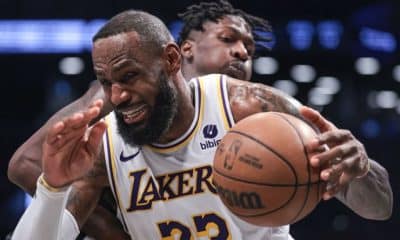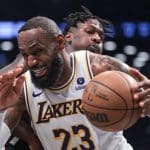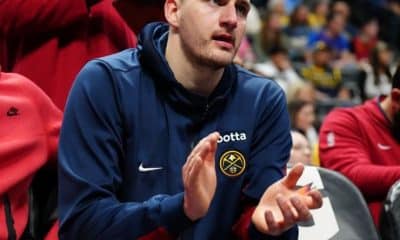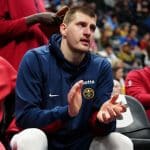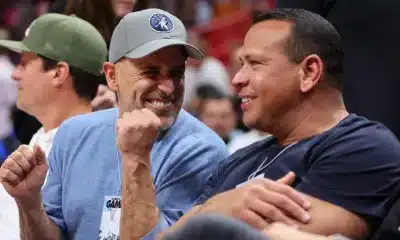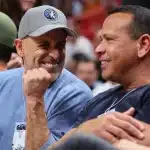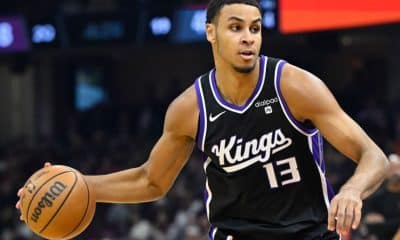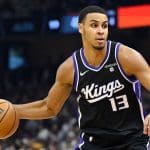NBA
Moving on Without Patrick Beverley
Are the Houston Rockets out of contention now that Patrick Beverley is out for the season?
On Tuesday morning, Houston Rockets point guard Patrick Beverley underwent surgery to repair a torn ligament in his left wrist. The injury will reportedly keep Beverley sidelined for roughly four months, which eliminates any chance of him returning for the upcoming playoffs.
Losing Beverley is a tough blow to the Rockets, especially at this point in the season where there is little the Rockets can do roster-wise to replace him. Beverley is known mostly for his tough perimeter defense and overall competitiveness. Beverley doesn’t put up huge box score numbers (10.1 points, 4.2 rebounds and 3.4 assists per game), but his energy and commitment to locking down opponents are, at least according to the eye-test, an important component of Houston’s defense.
So how do the Rockets fare moving forward without Beverley?
When we look into the Rockets’ season numbers, we actually see that Houston is, for various reasons, well-equipped to move on without Beverley.
It’s easy to forget that the Rockets are first and foremost a defensive team. On the season, the Rockets are tied for fourth in overall defensive rating, holding opponents to just 100.2 points per 100 possessions this season, according to NBA.com. Many may suspect that the Rockets manage this solid defensive rating in large part because of Beverley’s defensive contributions, but the numbers don’t quite backup that viewpoint.
When Beverley is on the court, the Rockets have a defensive rating of 102.3 points per 100 possessions, which is 2.1 points more than Houston’s overall defensive rating for the season. Even more telling, when Beverley is off the court, the Rockets defensive rating improves to 98.3, a figure which would rank second overall in the league this season, just behind the Golden State Warriors (97.5). An explanation for these surprising numbers could be the fact that Beverley, for the most part, faced opposing starting units and the Rockets’ backups in the aggregate outperformed opposing benches. Whatever the explanation, the fact is that the Rockets are a good defensive team this season, whether Beverley is on the court or not.
Interestingly, Beverley had a bigger impact on the offensive side of the ball, rather than the defensive end for Houston. For the season, the Rockets have an offensive efficiency rating of 103.6, which jumps up to 104.5 when Beverley is on the court.
One of Beverley’s biggest contributions to the Rockets’ offense is his three-point shooting, specifically the catch and shoot variety. This season, Beverley took a whopping 4.9 catch and shoot three-pointers per game, which is the same amount as sharpshooter Klay Thompson. Beverley connected on 38.1 percent of these three-point attempts, which is just 0.7 percentage points behind Wesley Matthews, who has firmly established himself as one of the best three-point shooters in the league. In addition to Beverley’s shooting, he is currently ranked third on the team in setting up teammates with 192 total assists. The only two teammates ahead of him are James Harden (510) and Trevor Ariza (193).
So how do the Rockets replace Beverley’s production? Well, Jason Terry now replaces Beverley in the starting lineup and is backed up by Pablo Prigioni. Terry, age 37, has sort of drifted around the league through the last three season, moving from the Boston Celtics to the Brooklyn Nets before ultimately ending up in Houston this season. His minutes per game have declined each season since the 2011-12 campaign until this season, where he is now averaging 21 minutes per game.
Terry can play both point guard and shooting guard, but has always been more of a scorer as evidenced by his career averages of 14.9 points and 4.3 assists per game. But like Beverley, Terry doesn’t need to be an elite distributor with the Rockets. With Harden initiating the offense as often as he does, Terry simply needs to be able to move the ball within the flow of Houston’s offense and knock down open shots when they come his way. And this is where Terry is able to step into Beverley’s shoes quite well.
Terry is currently ranked third all-time in three-pointers made with 2,060, trailing only Ray Allen and Reggie Miller. Over 15 seasons in the NBA, Terry is shooting 38 percent from beyond-the-arc and 39.1 percent from distance this season. Furthermore, Terry is currently shooting 40.1 percent on 3.5 catch and shoot three-pointers per game. That is a better percentage than Beverley and shows that Terry is well-suited to fill in for Beverley’s role on offense. To illustrate this, here are Beverley’s and Terry’s shot charts for this season.
Patrick Beverley
Jason Terry
Shot charts courtesy of ww.statmuse.com/nba
Also, consider the fact that the Rockets are statistically better with Terry on the court than they are with Beverley. With Terry, the Rockets manage an offensive rating of 102 and a defensive rating of 98.5, which is good for a +3.5 net differential. The Rockets have a better offensive rating with Beverley on the court, but even still, Houston has a better net differential with Terry on the court.
However, these numbers are most likely skewed with Terry spending a lot of time playing against backup units. These numbers could start to change with Terry now playing roughly 25 minutes per game over Houston’s last four contests. But on the season, Terry is maintaining a 0.65 rating in ESPN’s defensive real plus-minus metric, which is better than Beverley’s -0.25 rating. In fact, Terry is posting a better overall real plus-minus rating than Beverley (0.35 for Terry and -1.09 for Beverley), and is well ahead of other notable players that are considered above league average.
Of course, these all-in-one metrics don’t tell the whole story. The fact remains that Terry has never been much of a defender and, at age 37, will likely struggle to slow down the best point guards in the league moving forward. What happens if the Rockets have to face the San Antonio Spurs, Los Angeles Clippers or Portland Trail Blazers in a seven game series? Can Terry and Prigioni really be expected to slow down Tony Parker, Chris Paul or Damian Lillard? Probably not, which is why the Rockets will likely have to resort to putting guys like Trevor Ariza or Corey Brewer on their opponent’s starting point guard. It is a strategy that could work, at least in limited minutes. In fact, the Rockets could deploy a lineup of Harden at point guard, with Ariza and Brewer on the wings, giving the Rockets the size and speed to cross-match their opponents. The point is, the Rockets have the means to make due in this regard.
Where things really get dicey for the Rockets, however, is with Prigioni. Back in February, the Rockets traded Alexey Shved and a pair of future second-round picks for Prigioni to add a veteran point guard to the bench. Unfortunately for Houston, Prigioni has been ineffective (to put it mildly) in his time with the team. His shooting percentages have tanked (28.2 percent from the field and 21.2 percent from beyond-the-arc) and he seems hesitant to shoot the ball when open. Prigioni does move the ball effectively within Houston’s offense, but if he doesn’t start taking and making more shots from distance, then he isn’t really contributing enough offensively to spend more than a few minutes on the court per game. This is especially true considering the fact that Prigioni is also a poor defensive player (-0.60 defensive real plus-minus rating this season).
Ultimately, the Rockets should be able to manage this situation better than other teams because of Harden. Harden averages seven assists per game this season and has an incredibly high usage percentage (31.3). The ball is in his hands for huge portions of the game, which lessens the need for a prototypical point guard in Houston’s starting lineup. And again, as the on/off court numbers show, Houston is still a good defensive team when Terry is on the court.
Losing Beverley means that Houston won’t have a competitive ball-hawk to go toe-to-toe with the elite point guards that the Rockets may face in the postseason. There is no doubt that losing that dynamic hurts the Rockets. But Houston is a good defensive team and now has Dwight Howard back in the lineup to anchor the team’s defense and protect the rim (assuming he can stay healthy moving forward).
Losing the starting point guard would be devastating for teams like the Golden State Warriors, Los Angeles Clippers, Portland Trail Blazers, San Antonio Spurs or Oklahoma City Thunder. But for Houston, this is a setback that can be overcome with lineup adjustments, an enlarged role for Terry, keeping Prigioni off the court (at least until he finds his shooting stroke) and perhaps relying even more on Harden to initiate the team’s offense.
Beverley may be out for the season, but that doesn’t mean the Rockets are out of contention to win it all this season.
Add Basketball Insiders to your Google News Feed!
-
Main Page 1 week ago
LeBron James joins Michael Jordan as only NBA players with multiple 40-point games after turning 39
-
Main Page 1 week ago
Nikola Jokic 1st NBA player since Oscar Robertson with 26+ points, 18+ rebounds, & 16+ assists in a game
-
NBA 1 week ago
Ex-MLB star Alex Rodriguez vows to keep trying to buy Timberwolves franchise despite rejection
-
Main Page 1 week ago
Kings are 14-5 this season when Keegan Murray scores 19+ points


